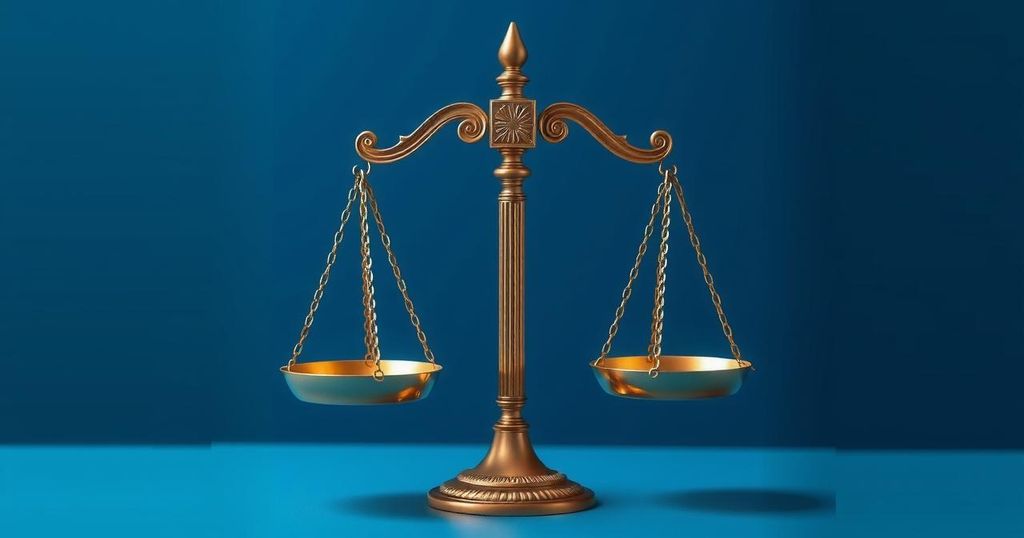Family of Deported Venezuelan Asserts Innocence Amid Trump’s Claims
The family of Francisco Javier García Casique rejects Donald Trump’s claims labeling deported Venezuelans as criminals. They assert García is innocent, a hardworking barber. The video of deportations sparked outrage, especially among advocates who emphasize the wrongful treatment of migrants lacking criminal backgrounds. Many deportees are seen as victims of erroneous affiliations with gangs based on tattoos. Calls for justice and proper treatment of migrants are intensifying amid these troubling deportations.
The family of Francisco Javier García Casique, a 24-year-old Venezuelan deported to a prison in El Salvador, vehemently rejects assertions from the Trump administration that the migrants are dangerous criminals. They assert that García, a hairdresser from Maracay, is innocent and has never faced any legal troubles. His younger brother, Sebastián García Casique, expressed dismay upon seeing Francisco among those deported, emphasizing his brother’s support for the family and his character as a hardworking individual.
Francisco was arrested by immigration officials on March 2, with plans for his deportation to Venezuela scheduled shortly thereafter. However, those plans dissolved when El Salvador’s President, Nayib Bukele, shared a controversial video depicting the deported Venezuelans being forcibly detained. Sebastián described the pain of seeing his brother in such a predicament, highlighting the stark contrast between Francisco’s innocent life and the prison environment he was thrust into.
Lindsay Toczylowski, an immigration lawyer, shared her shock upon recognizing her own client in the same sensational video. She condemned the treatment of migrants and the apparent escalation of human rights abuses, noting the unjust stigmatization of these individuals. Toczylowski pointed out that both her client and García were wrongfully categorized as gang members based on tattoos that did not reflect any criminal affiliations, as experts dispute these assumptions.
During a recent wave of deportations, over 260 Venezuelan migrants were sent to El Salvador, many lacking any criminal backgrounds. Families of these migrants have been vocal, demanding the release of their loved ones who face the grim realities of Bukele’s harsh detention policies. One mother, Mercedes Yamarte, characterized her son, Mervin, as a good person misidentified by authorities due to innocuous tattoos.
García documented his journey of striving for a better life through social media, moving from Venezuela to Peru and then aiming for the United States. His dreams fast turned into a nightmare following his unexpected deportation to a notorious prison environment. Immigration advocates have raised concerns about the new trajectory in dealing with deportations, where previously benign solutions have transitions to severe repercussions.
Experts have noted that many of those deported may not be associated with any criminal activity, expressing outrage at the injustice faced by individuals like García. Adam Isacson from the Washington Office on Latin America highlighted the unprecedented nature of such deportations, warning against the treatment of innocent migrants as if they were criminals. Sebastián emphasized his brother’s integrity and called upon the Trump administration to rectify the wrongs faced by the innocents among the deported.
Sebastián continues to plead for justice, urging that innocent individuals should not be punished for crimes they did not commit. He holds the powerful accountable for their actions, questioning the basis of the deportations and insisting on the need for due process.
The deportation of Francisco Javier García Casique has ignited widespread concern regarding the treatment of Venezuelan migrants by U.S. authorities. The claims of criminality against these individuals have been firmly rejected by their families, emphasizing their innocence and hard work. The situation highlights a troubling shift in immigration policies, raising alarms about human rights abuses and the need for accountability in the deportation process. Advocates and families alike demand justice, urging that innocent lives not be subjected to harsh penalties and inhumane treatment.
Original Source: www.theguardian.com




Post Comment